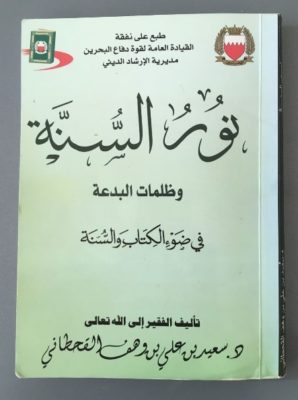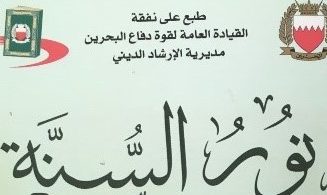Analysis and Translation of a Bahraini Military Religious Manual
See a PDF file of the analysis and full translation here.

Bahraini activists have long reported that the kingdom’s armed services engage in deliberate religious discrimination, with Nabeel Rajab, the country’s leading human rights defender, even prosecuted for describing the security apparatus as an “incubator” for violent extremism due to the rate of defections to militant groups like the Islamic State (also known as ISIS, ISIL, and Daesh).[1] This reporting has been increasingly borne out in recent scholarship, with analysts finding evidence of acute anti-Shia Muslim hiring bias;[2] “religious advising services … to make sectarian divides more salient;”[3] and “‘mental advisors’ within [security units] who gave hateful speeches against Shiites.”[4] Members of the Bahraini military have stated in interviews that, in addition to religious supervisors, the government embeds “intelligence personnel within each BDF unit”[5] to monitor perceived dissent and enforce ideological conformity.[6] Still, there has been little primary documentation made available about the training or religious materials disseminated throughout Bahrain’s secretive security establishment, which refuses to publicly release detailed information about its structure, budget, or even its size.
Working with local activists, however, ADHRB has been able to obtain one of these documents: Nur al-Sunna (Light of the Sunna), a religious pamphlet published by the Bahrain Defence Force (BDF) through its Department of Religious Education, at the expense of the military’s High Command. It is distributed for free at BDF facilities, including mosques, where preachers are reported to recommend literature to attending military personnel. ADHRB has reviewed Nur al-Sunna in its original Arabic, finding direct evidence to corroborate the reports of extremist religious instruction officially sanctioned by Bahraini security institutions: it is a religious text ostensibly intended to influence the behavior of military personnel and it contains explicit sectarian language, up to and including justifications for violence against non-Sunni sects of Islam. The production and propagation of such material – with the apparent approval of senior military leadership – is particularly alarming as the authorities move to further incorporate the BDF into civil governance, with a 2017 constitutional amendment authorizing military courts to try civilians accused of crimes related to national security.[7] Presented below is ADHRB’s brief summary of Nur al-Sunna’s contents, as well as an unofficial English translation.
Summary and Analysis
Written by Dr. Saeed bin Ali bin Wahaf al-Qahtani, Nur al-Sunna is organized into two parts based on the description of the Sunna as “nur,” or light, and heresy as “darkness.” In the first part, “The Light of Sunna,” Dr. al-Qahtani provides an interpretation of the Sunna (the tradition of Prophet Mohammed and his companions). In the second part, “The Darkness of Heresy,” he argues that anyone who disagrees with the previous chapters – or anyone who does not commit to following this interpretation of the Sunna – is a heretic or apostate. The author provides a description of heresy and thereby denounces several sects of Islam as heretical. As Dr. al-Qahtani notes, the designation ‘non-believer/heretic/apostate’ can warrant abandonment/exile or even execution.
Dr. al-Qahtani cites a number of Shia religious practices as heretical, including the Prayer of Raghaeb, fasting on Mid-Sha’aban, and celebrating the birth of the Prophet Mohammed. He describes the purported reasoning behind these practices and asserts that they are based in “ignorance” and other “forms of heresy.” According to the argument, these deviations from the Sunna harm the Muslim community and presuppose that the religion is somehow incomplete; therefore, those who continue to propagate and engage in these practices are ostensibly challenging the authority of Allah.
On page 48, in the sixth section, on the “Religious Verdict of Heresy,” Dr. al-Qahtani defines heresy as coming in three forms of “evilness”: major sins, minor sins, and Kufr (disbelief). He suggests that many groups that claim to be Muslim are, in fact, disbelievers and sinners, as they fail to adhere to the Sunna. In the previous section, he explicitly names “al-Qadiyaniya, al-Bahaeya, and all the Batiniyya groups such as Ismailia, Nasiriya, Durooz, and Rafidah [a pejorative term for Shia]” as “misguided sects” that engage in heresy.
In the seventh section, on “Types of Heresy Near Graves,” Dr. al-Qahtani also describes certain Shia burial and worship practices as “shirk (believing in another God besides Allah).”[8] He goes on to write on page 50 that all those “who commit such acts should repent or else they must be killed.” In the eighth section, entitled “Contemporary Acts of Heresy,” Dr. al-Qahtani describes Shia as “Majoos/Zoroastrians” and states that the practices of “al-Rafidah…go against the Sunna of the prophet Mohammed.” A “rational person” could not turn away from the Sunna to “imitate al-Rafidah,” he concludes.
Ultimately, Nur al-Sunna (Light of the Sunna) emphasizes three key points:
- Sunnism is the pure or true form of Islam.
- Any practice that is not found in the Sunna is heresy. Other sects of Islam – insofar as they are committed to these other practices – engage in different levels of heretical behavior.
- Heretical groups harm society and therefore – according to the author’s interpretation of the Sunna – acts of discrimination and possibly even violence targeting them can be justified.
A note on translation: ADHRB has produced an unofficial translation of Nur al-Sunna from its original Arabic into English. It is not an official or exact translation, and it is presented in order to provide an English approximation of its contents. It is annotated by page number corresponding to the physical document. ADHRB is able to provide the original Arabic upon request.
Click here for the full translation with analysis.
________________
[1] “Bahrain’s Prominent Human Rights Activist Arrested for Criticizing Police Defectors Who Joined ISIS,” Global Voices, 1 October 2014, https://globalvoices.org/2014/10/01/bahrains-prominent-human-rights-activist-arrested-for-criticizing-police-defectors-who-joined-isis/
[2] Justin Gengler, Group Conflict and Political Mobilization in Bahrain and the Arab Gulf: Rethinking the Rentier State, Indiana University Press: 2015, Print.
[3] Dorothy Ohl, “Bahrain’s ‘Cohesive’ Military and Regime Stability amid Unrest,” in Eds. Holger Albrecht, Aurel Croissant, and Fred H. Lawson, Armies and Insurgencies in the Arab Spring, (2016), Print, 145-167.
[4] Ibid.
[5] “The regime appears to have put in place coercion mechanisms to formally monitor soldier behavior and in doing so deter insubordination. A former BDF officer related in an interview that there are intelligence personnel within each BDF unit. These individuals are Bahraini, Syrian, and Jordanian, and there are perhaps nine to fifteen per unit. According to the former officer, these intelligence officials can check a soldier’s phone and mail as well as who he talks to, what he says, and more. Intelligence officials are responsible for writing weekly or monthly reports about what they find. If a military member expresses antiregime [sic] ideas and intelligence officials have evidence, that member can be imprisoned. Worse yet, the BDF have torture facilities on its premises. If intelligence officers do not have sufficient evidence, they will make a note of the suspected behavior so they can put pressure on the security member in the future…It is reported that the regime uses family networks to indirectly coerce security force members into subordination.” Ibid.
[6] “The BDF’s own Military Intelligence (MI) corps, notwithstanding its name, is a ‘full-service’ spy organization: it is involved both in domestic and foreign intelligence operations. Naturally, one of the MI’s key responsibilities is to ensure that the BDF is free of major dissent and remains loyal to the monarchy. Intelligence officers are embedded in BDF units and their surveillance of all aspects of the soldiers’ lives are said to be thorough. Of all Bahraini law enforcement agencies, the MI has the most fearsome reputation.” Zoltan Barany, The Bahrain Defence Force: The Monarchy’s Second-to-Last Line of Defense, Center for Strategic International Studies, 9 December 2016, https://csis-prod.s3.amazonaws.com/s3fs-public/publication/161214_Bahrain_Defence_Force.pdf
[7] “Bahrain’s king approves military trials for civilians,” BBC, April 2017, http://www.bbc.com/news/world-middle-east-39478101
[8] This is a religious concept referring to idolatry, or religious belief verging on polytheism. The Oxford Dictionary of Islam defines shirk as a “theological term referring to the association of someone or something with God, that is, putting someone or something in the place of God, thus deviating from monotheism.” See: “Shirk,” The Oxford Dictionary of Islam, edited by John L. Esposito. Oxford Islamic Studies Online, http://www.oxfordislamicstudies.com/article/opr/t125/e2195





